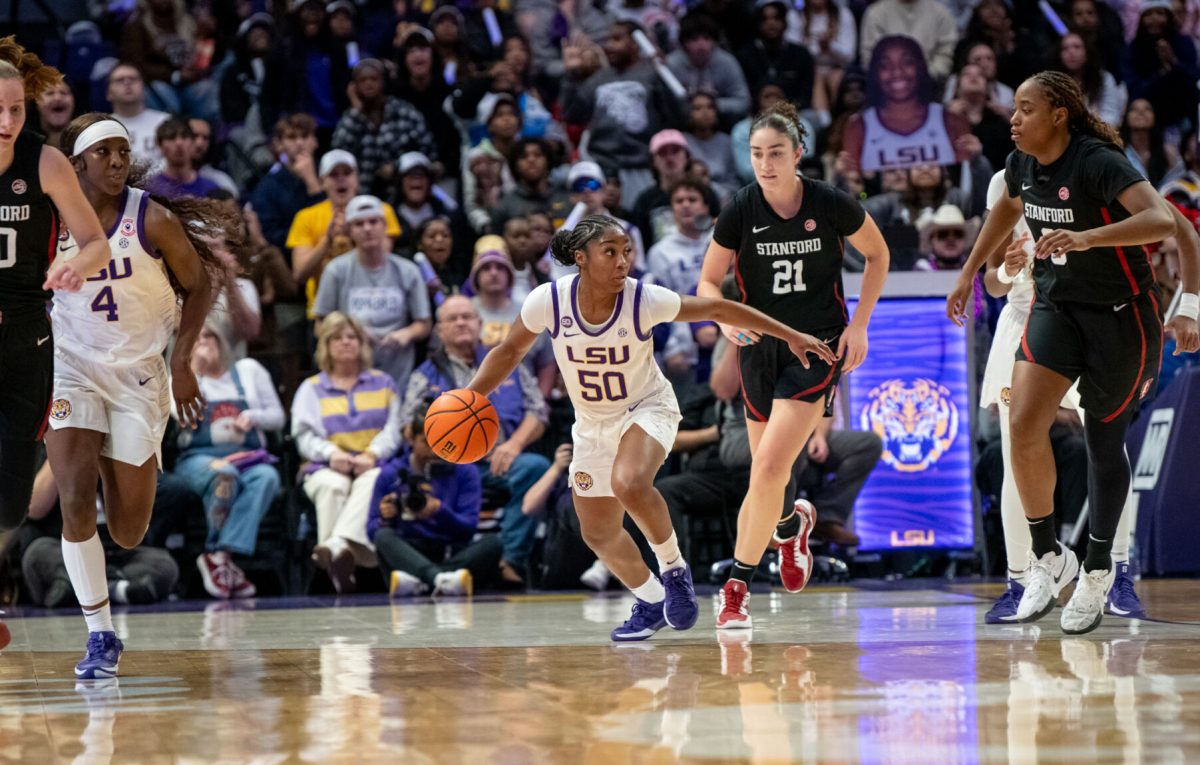You’ve probably seen it before. A bright-eyed Louisiana high school kid sits at a table with a microphone in front of him, his family, close friends and coaches surrounding him. The cameras are flashing, the Instagram Live is rolling, and he is getting ready to announce one of the biggest decisions of his life.
Finally, the anticipation comes to a peak, and he reveals his choice. Immediately, the celebration is on. It’s a triumphant sight. Almost instantaneously, every media outlet is posting about the news: where this player is going, how many stars he has, how it affects that team’s recruiting ranking. In the comment section, many people express their congratulations, but someone is unimpressed.
“Should’ve stayed in Louisiana. Like I said, Brian Kelly can’t recruit! LSU missed on this guy,” says @geauxtigahsfan827.
Sounds familiar, right?
Whenever an in-state recruit spurns LSU, it seems that fans and pundits have a tendency to take note. It’s unacceptable. If a good football player makes it out of the Louisiana border. It has to be someone’s fault, and LSU has to do better.
This attitude implies that LSU would be better if it added more in-state recruits, but is it logical to hold LSU to this standard? How important is in-state recruiting to a football program’s success?
When talking about success, you have to start with Alabama. In Alabama’s 2020, 2021 and 2022 recruiting classes, it brought in eight, five and six in-state recruits in classes with sizes of 25, 27 and 25, respectively. That means that in the last three recruiting classes, roughly 25% of Alabama’s recruits were in-state. Over that same time period, 40% of LSU’s recruits came from Louisiana.
LSU has not been a better football program than Alabama since 2020, so the connection between in-state recruiting and success may be arbitrary. For the sake of a larger sample size, let’s look at some other teams. In those same classes, 53% of Texas A&M’s recruits were in-state, as were 52% of Florida’s and 42% of Georgia’s.
It’s clear that there isn’t really much of a correlation with success and volume of in-state recruits. Alabama and Georgia have been the two best programs over these time periods, but their percentages are not similar.
There are less successful programs that had more in-state recruits than Georgia and less successful programs that had fewer. Still, there must be some sort of logic that explains why it’s considered so important that LSU retains in-state recruits.
A factor that hasn’t been considered is the quality of the in-state recruits in each of these states. Across these same three recruiting classes, there were 34 total recruits ranked in the ESPN300 recruiting rankings from Alabama. There were 141, 132 and 84 from the states of Texas, Florida and Georgia, respectively. Louisiana had 32 in-state recruits ranked in the ESPN300 across those three classes.
Generally speaking, it’s recognized that the best states for producing high school football talent are, in no particular order, Florida, Texas, California and Georgia. Louisiana and Alabama are not far off—in fact, they’re probably next in line—but they do belong in a separate, lower tier.
Because Alabama doesn’t have access to the same premier in-state talent as some other schools, the program often goes to these recruiting hotbeds and plucks players from these states (current starting quarterback, Bryce Young, is from California). Alabama has the national brand to attract these distant recruits easily. LSU, however, does not do the same (or at least not to the same degree). LSU’s percentage of recruits that come from in-state is much higher than Alabama.
This is likely because of another factor: LSU has little to no true competitors for in-state recruits. Alabama is competing with Auburn. Texas A&M has to worry about Texas Christian University, Baylor, Texas Tech and University of Texas at Austin. Florida is fighting against Florida State and Miami.
LSU is the only Power Five school in the state of Louisiana, and that leaves it without a true comparison. There is no other school in a state with such good high school talent that has no competition for it.
LSU is in such an incomparable position that it’s impossible to pull from data to answer the original question: is there a logical basis to the emphasis on in-state recruiting around LSU? That might provide an answer in itself.
Since LSU has such great talent and no one to compete with, it has a rare, built-in advantage. It’s seen as a failure when a recruit gets away because it’s a missed opportunity for LSU to capitalize on that advantage.










